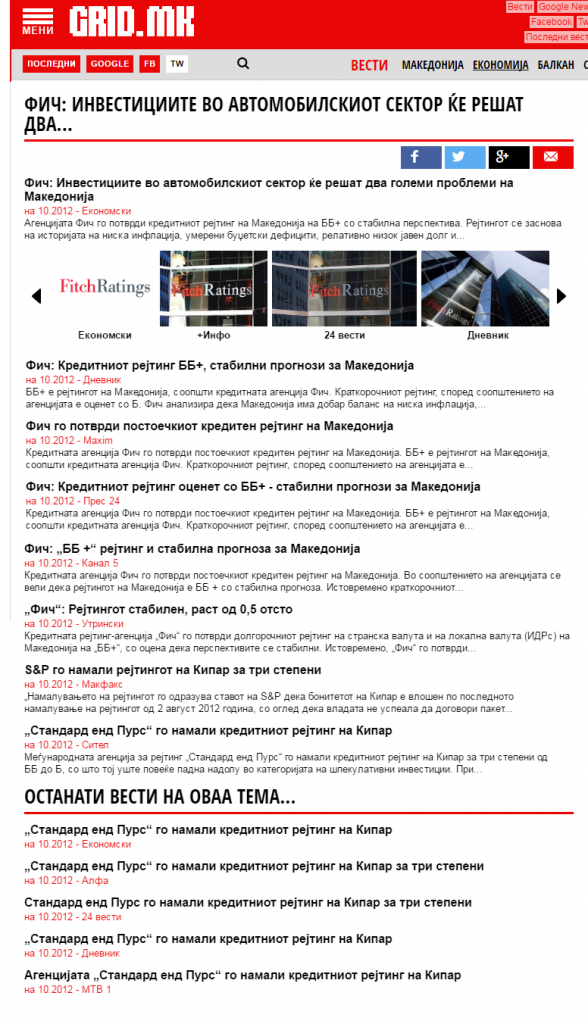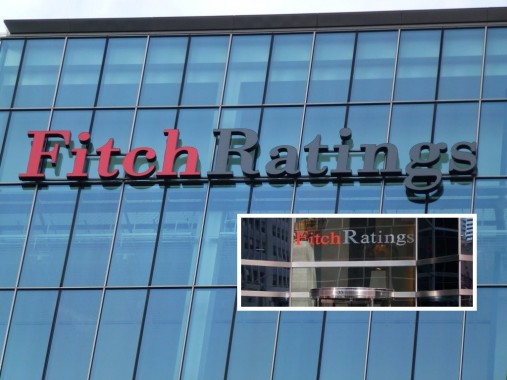Fitch credit ratings on Macedonia seem suddenly banished from the media
Published in Analyses
on 26 - 07 - 2016 Author: Vladimir PetreskiThe downgrading of Macedonia’s credit rating by Fitch seemed inevitable since 2013, when Standard & Poor’s lowered their credit rating on the country from BB to BB-. This means Fitch’s BB+ grade and Standard & Poor’s BB- grade are two levels apart. Having in mind the current deep political crisis, country’s credit rating is on the way of being downgraded. And that is the reason enough for some media to suddenly stop reporting on country’s credit rating developments all of a sudden
Author: Vladimir PETRESKI
Until last year, the propaganda machinery regularly reported semiannualy on Macedonia’s credit rating, published by the Fitch Ratings agency. The propaganda machinery was especially eager to spread the report details related to the decreasing unemployment rate, the foreign investments and percentages of Macedonia’s GDP growth. But lately, the news on Macedonia’s credit rating by this agency disappeared as they never existed, even though they used to be a regular component of the propaganda menu in the pro-government media for several years.
What’s going on? It’s quite simple, actually. In February this year, Fitch gave a review containing the words “negative outlook” for the first time. This simply means that Macedonia’s credit rating is headed to negative direction, and if this situation persists, the credit rating will be downgraded in the next 12 to 24 months. This “negative outlook” was repeated in May. Fitch Ratings then reiterated that the outlook for the credit rating is still negative, which means it will be downgraded. The reasons it gave are the prolonged political instability, which led to postponement of the general elections, but the growth of the public debt has equally important role. Furthermore, the announcement for the downgrade comes in spite of the fact that the country has a projected GDP growth and Fitch forecasted that the growth will continue this year and to be 3.6% in next one, too. However, that growth was not enough to convince the agency to maintain the existing BB+ credit rating, and also not enough to prevent it to announce a downgrade of the credit rating, probably to the next lower grade – BB. Nevertheless, according to Fitch’s Grade scale (Standard & Poor’s grade scales are similar), every grade below BBB- is dubbed as non-investment or “junk” credit rating. Now, evidently, the BB+ grade, which is one level lower than BBB-, will become even lower.
CREDIT RATING TO GO LOWER – SILENCE IN THE PRO-GOVERNMENT MEDIA
This announcement was enough to make the news about the credit rating by Fitch disappear from the pro-government media. And all of this is happening regardless of the fact that the government is paying for this credit rating, according to what the economic analyst Sam Vaknin stated in this interview.
Nonetheless, coverage of the ratings by Fitch wasn’t so bad until now. The media in Macedonia were at least informing about that credit rating in the past few years. But that was not the case with Standard & Poor’s. This international agency, whose credit ratings are paid for by the investors, not the Macedonian government, has lost the favor of the pro-government media since 2013. It was then, after Standard & Poor’s lowered the country’s credit rating from BB+ to BB, that it was proscribed. Things escalated immediately, and the pro-government media broadcasted only the reaction of the Ministry of Finance on the unfavorable grade, but nobody published the explanation regarding the grade. The Ministry of Finance even accused “Standard & Poor’s” for interfering in the internal affairs of the country just because the agency dared to form an opinion regarding the political situation in Macedonia, i.e. to take into consideration the violent expulsion of the MPs from the Parliament of the Republic of Macedonia in the session when the budget for 2013 was discussed.
Having in mind the current boycott of the pro-government media when it comes to the rating by “Fitch”, the Ministry now does not state whether “Fitch” is also interfering in the internal affairs of this country, when in its last press release sаys:
“The postponement of the elections in Macedonia extends the country’s political deadlock, creating additional pressure on the country’s ‘BB+’ sovereign rating. The negative Outlook on the rating reflects the risks to the political stability that emerged in 2015, as well as the rising debt-to-GDP ratio. Macedonia’s Parliament this week agreed to indefinitely postpone elections due on 5 June after the boycott by the opposition parties. June’s poll had itself been rescheduled from 24 April, when elections were meant to take place under the road-map brokered last summer by the European Union to ease tensions after the opposition came out with allegations of widespread wiretapping by the government. Some progress has been made with the implementation of the road-map and the postponement of the elections scheduled for June, which were unlikely to have been deemed free and fair, and that could help re-invigorate the process. The European Commission said the decision created “a renewed opportunity for the country to address a number of serious issues at the heart of the prolonged political crisis.” However, the postponement also highlights the height to which the political polarisation climbed, and how low the public confidence in the political system is”.
So “Fitch” does not mention any wiretapping by the opposition, as the propaganda in the country claims. However, on an international level, except the VMRO-DPMNE’s paid propaganda in the US (contracts worth more than 2 million euro until the end of this year), no other individual or institution has stated any opinion or doubt that the opposition was to blame for the wiretapping and “Fitch” does not differ in this, but instead, as we can see, mostly quotes EU’s positions.

- This was the situation until recently: “Fitch’s” grades for Macedonia were dominant, whereas the media were publishing only the “Standard & Poor’s” grades related to the credit ratings of distant countries (click for larger picture)
Unfortunately, only “Utrinski vesnik” daily and no one else informed about “Fitch’s” report, as this search done in the news aggregator “time.mk” shows. The pro-government media really had a hard time thinking how to publish “Fitch’s” press release, but also thinking how to spin it, because the current situation does not leave much room for that. The problem arose with the previous wrong interpretation of some of the reports of the agency related to the outlooks, i.e. the forecasts about the future direction of the grade. “Fitch” and the other agencies have three grades: the outlooks can be “stable”, “positive” and “negative”. The pro-government media were interpreting these outlooks as if they were referring to the entire economy (“Fitch says the Macedonian economy is stable”). The Outlook Stable simply means that the agency does not forecast increasing or decreasing of the credit rating, and nothing else. Just like the Outlook Positive, which means that the grade will go up in 12 to 24 months, and the Outlook Negative means the opposite – decreasing the credit rating grade again in 12 to 24 months. But these outlooks do not describe the economy as such. You can have falls in the economy, but if you have big reserves, “Fitch” will not have a problem to award you with “Outlook Stable” because besides the economic fall, you have enough resources to repay your debts to the world. And that is all “Fitch” is interested in. But, every time when “Fitch” would have had “Outlook Stable” for Macedonia, the propaganda would have immediately written that the entire economy is stable, and now when the outlooks are negative, there is no method to spin all that.
TRIBULATIONS WITH THE CREDIT RATING SPINS
The propaganda spins, when it comes to “Fitch’s” reports, did not stop here. Every time, when “Fitch” wouldn’t change the poor and un-investment BB+ credit rating, the propaganda machinery would write that ““Fitch” just confirmed the credit rating”, as if it is some big achievement. But, having in mind this forced and long-term spreading of the propaganda, now when we have credit rating decrease, the propaganda simply decided to remain mute.
Plus, the decrease of the Macedonian credit rating by “Fitch” was inevitable, even since 2013, when “Standard & Poor’s” decreased the credit rating of this country from BB to BB-. This means that the difference between “Fitch’s” BB+ grade and “Standard & Poor’s” BB- grade is two whole levels. The fact that the difference between these two grades lasted for three years is a bit unusual, but having in mind the deep political crisis we are in at the moment, “Fitch” cannot procrastinate further the decreasing of the credit rating. Neither the money nor the power can help in this case. Having this situation in mind, we should not be astounded by the fact that the government is rushing to obtain new Eurobond with current interest rate of around 5%, because the interests rates will most likely increase, after the expected credit rating decrease from “Fitch” and its nearing to the credit rating from “Standard & Poor’s”. Let’s not forget that the 150 million euro Eurobond, obtained when Trajko Slavevski was a Minister of Finance in 2010, had an interest rate of 9.9%.
Anyway, the credit rating reports from “Fitch” are becoming illegal for the pro-government media and they will have the black sheep treatment, i.e. they will be avoided. And, we are going to be witnesses of absurdity which already exists when it comes to “Standard & Poor’s”. Namely, the government media will publish news about “Fitch’s” rating for distant countries such as Vietnam, South Korea or Chile, but they will not publish news for Macedonia. In fact, such is the case with the reports from “Standard & Poor’s” for three years already (see the image from Grid.mk above). They can write about the credit ratings of distant countries, i.e. such news from the Macedonian Informative Agency can be republished, but the reports about Macedonia’s credit rating are forbidden and cannot be published. And so, we are going back to the journalistic habits from the era of the communism, when the then journalism was informing for odds and ends from all over the world, for every negative occurrence, but the same occurrences were slurred over at home.


